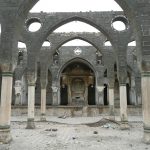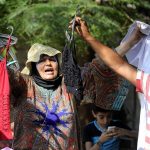By Stephen Hollingshead and Loay Mikael – The Hill –
The horrors of the ISIS genocide continue, and the most deliberative body in the world is standing in the way of fixing a major problem in our government’s response to that tragedy.
H.R. 390, the Iraq and Syria Genocide Emergency Relief and Accountability Act, passed the House unanimously on June 6. Then 40 legislative days passed, and the Senate recessed without moving the bill. We implore the Senate to take action now.
The most important thing about this bill is that it would end the USAID/UNDP discrimination against religious minorities qua religious minorities, which rests on an obstinate legal theory at the UN. In spite of the fact that the UN Genocide Convention, to which the U.S. is a party, explicitly addresses the need to redress genocide based on religion, the UN refuses to aid groups based on their religion.
Because USAID sends its aid via UNDP, this means that Christian groups in Northern Iraq, for example, have received essentially no humanitarian assistance from the UN or from the U.S. Local churches have shouldered the burden, relying on private sector help (the Vatican and the Knights of Columbus have been very generous, for example) and that well is running dry at the time when money for rebuilding ISIS-devastated villages is most acute.
H.R. 390 does not appropriate any new aid for Iraq or Syria — it merely ensures that aid already flowing starts flowing to the victims who need it most, victims almost ignored by the current money flows. The bill also takes important steps to ensure that the government of Iraq is collecting evidence against and prosecuting perpetrators of these crimes.
As advocates for the victims of ISIS and for U.S. interests in a Middle East on fire, we are impatient to see this problem fixed. One of us (Mikhael) translated H.R. 390 into Arabic and published it in Iraq, where it generated hundreds of grateful responses by email, telephone, and social media from from Christians and Yazidis in Erbil, Dohuk, and on the Nineveh Plain, people who have been displaced from their homes by ISIS. If the hope and excitement expressed in these responses could be translated into a single line, it would be: “This gives us hope; if the U.S. makes this law, we will stay in Iraq.”
The heaviest of heavyweights of the aid industrial complex — UNDP and USAID — are beset by errors of the head rather than the heart, but those errors cause real suffering in the developing world. They are central planners who do not understand that decentralized growth fostered by property rights is far more important for economic stabilization than large top down projects.
Moreover, and especially problematic in Iraq and Syria, they operate under a mistaken legal theory that even when they are directed to aid the victims of religious genocide, they may not do so through religious organizations. H.R. 390 will remove that stumbling block, at least insofar as US aid is concerned.
As the Genocide Working Group repeatedly points out: From the perspective of the most vulnerable groups suffering at the hands of ISIS, Baghdad is a black hole for funding. When dollars go into Baghdad, the minorities of the north do not see a dinar. H.R. 390 will put an end to that and allow relief and aid to flow directly to the groups who need it the most and can most effectively rebuild the communities ravaged by ISIS.
Returning from Iraq last week, one of us (Hollingshead) met up in Rome with the bill’s author, Rep. Chris Smith (R-N.J.), to discuss H.R. 390’s prospects in the Senate. “It’s been a long time coming,” he said. No kidding.
Rep. Smith has spoken with party leaders from the other side of the aisle, who assure him they support the bill. He was too polite to say it this way, but it is clear: H.R. 390 will pass just as soon as Sen. Bob Corker (R-Tenn.), chairman of the Senate Foreign Relations Committee, lets it come up for a vote in committee and Majority Leader Mitch McConnell brings it to the floor.
Genocide is not only theft, rape, and murder: It is eradicating a people from a place. So making it possible for genocide victims to return home is the only part of all this inhumanity that can really be undone. Our Senate should do its part to respond to this emergency now.
Dr. Stephen Hollingshead is an entrepreneur and economic development advisor who directs IraqHaven.org. Loay Mikhael is the foreign affairs advisor for the Chaldean Syriac Assyrian Popular Council in Iraq, and the Iraq advisor to In Defense of Christians, an organization advocating for the protection and preservation of Christians and Christianity in the Middle East.
______________
Photo Credit: Getty Images
http://thehill.com/blogs/pundits-blog/international/349258-senators-stop-the-middle-east-genocide-bring-aid-bill-to-the





